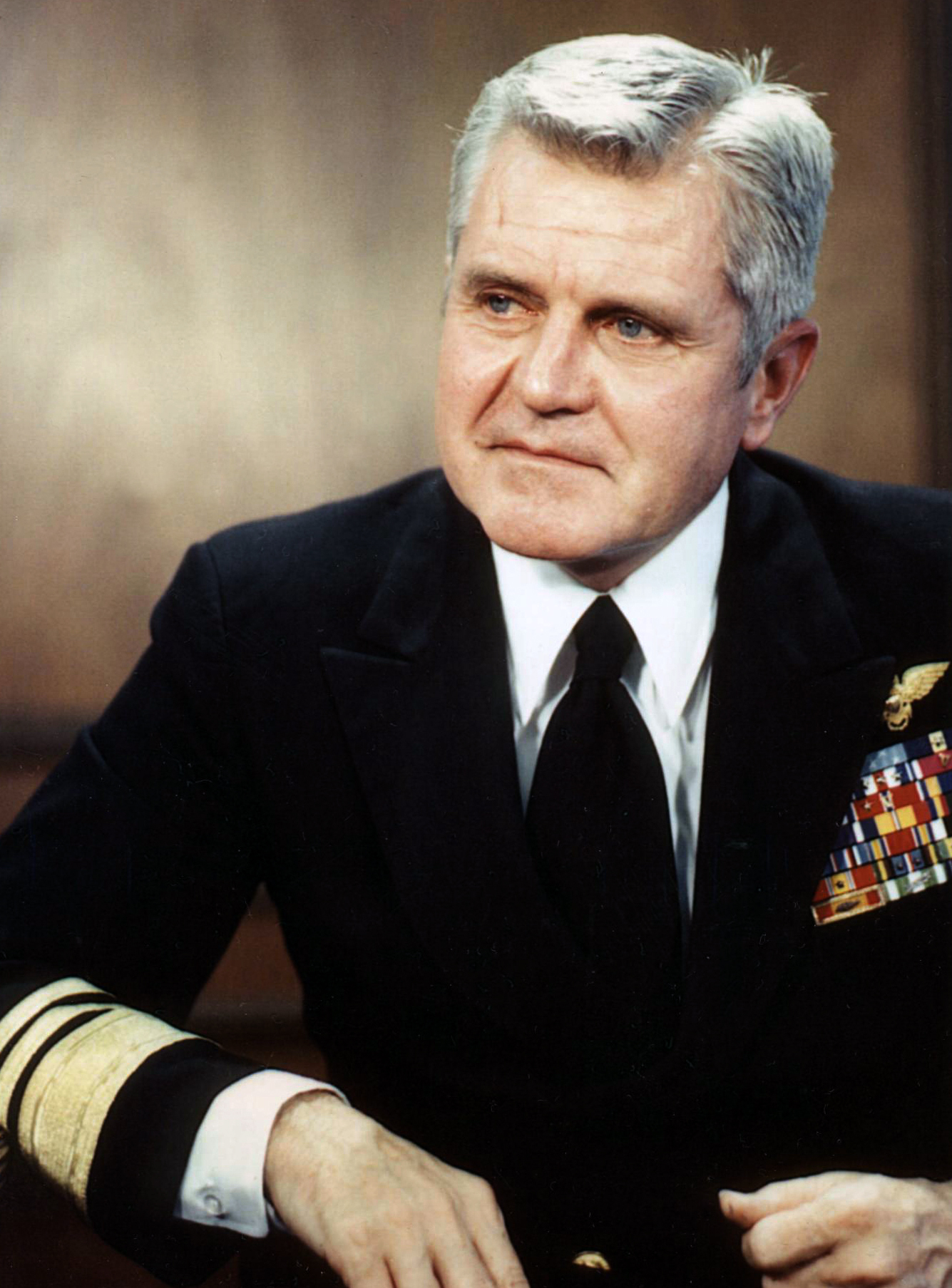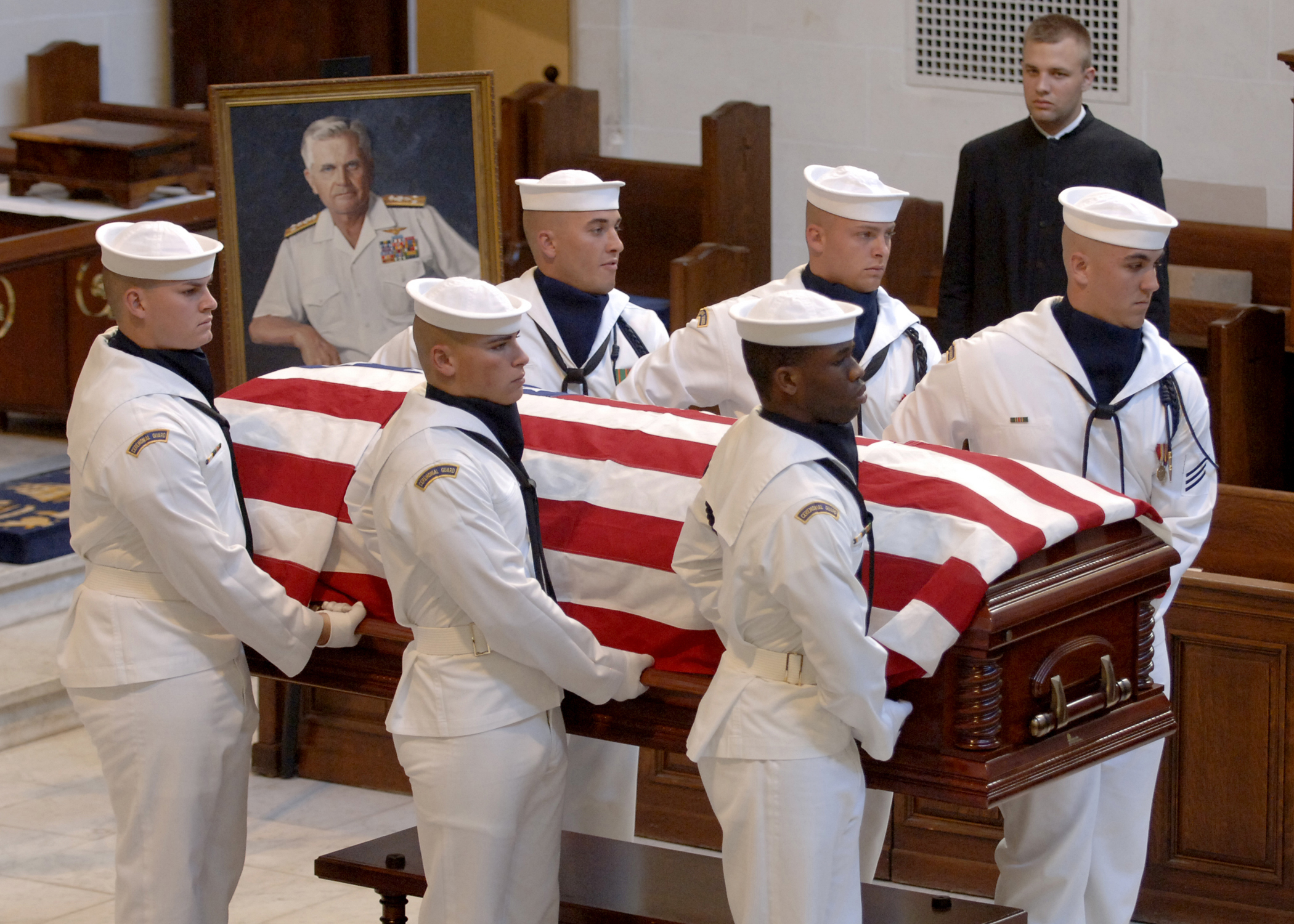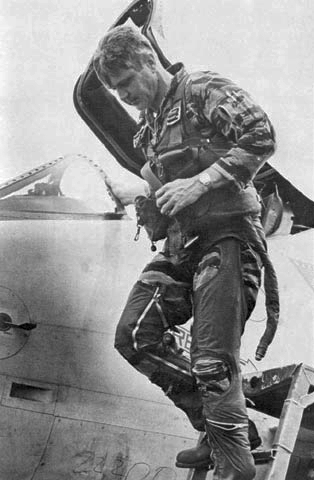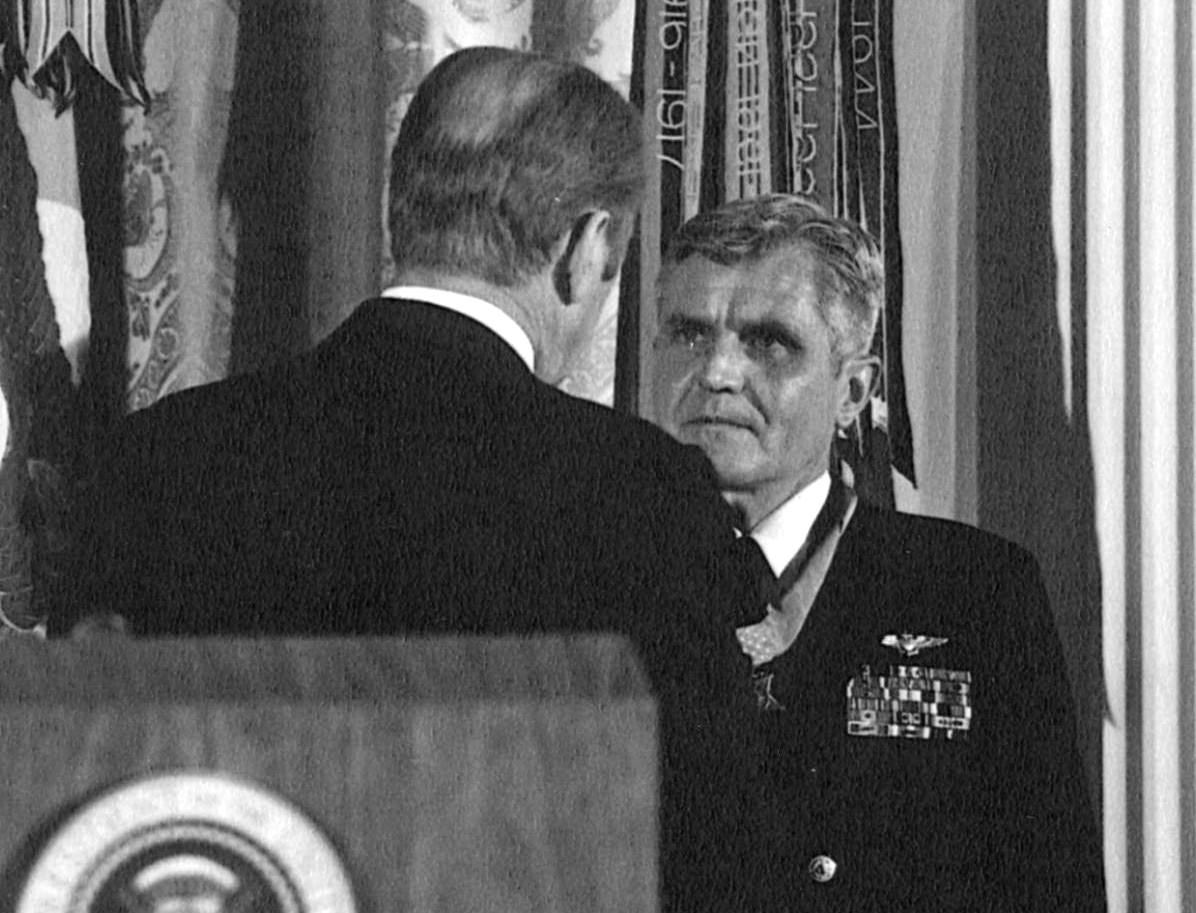1. Overview

James Bond Stockdale (December 23, 1923 - July 5, 2005) was a United States Navy vice admiral and aviator who was awarded the Medal of Honor in the Vietnam War, during which he was a prisoner of war for over seven years. As the most senior naval officer held captive in Hanoi, North Vietnam, Stockdale demonstrated extraordinary resilience and leadership. He commanded aerial attacks during the 1964 Gulf of Tonkin incident and was shot down on September 9, 1965, leading to his long period of imprisonment. After his release in 1973, he continued his naval career, serving as president of the Naval War College from 1977 to 1979 and as president of The Citadel from 1979 to 1980. Stockdale later gained national prominence as a candidate for vice president of the United States in the 1992 presidential election on Ross Perot's independent ticket. His experiences and philosophical insights, particularly his adherence to Stoicism, profoundly influenced his approach to leadership and adversity, leading to the concept known as the "Stockdale Paradox." The Arleigh Burke-class guided missile destroyer USS Stockdale (DDG-106) is named in his honor.
2. Early life and education
James Bond Stockdale was born in Abingdon, Illinois, on December 23, 1923. He was the son of Vernon Beard Stockdale (1888-1964) and Mabel Edith Stockdale (née Bond; 1889-1967). After a brief period of study at Monmouth College, he entered the United States Naval Academy in Annapolis, Maryland, in June 1943. His given names, "James Bond," are unrelated to the fictional spy character created by Ian Fleming, as Fleming coined the name long after Stockdale's birth.
4. Civilian life and public service
After retiring from the U.S. Navy, James Stockdale transitioned to a distinguished civilian life marked by significant academic contributions, extensive writings, and an unexpected foray into national politics. His post-military career further cemented his legacy as a thinker and public servant.
4.1. Academic work and writings
Following his departure from The Citadel, Stockdale became a fellow of the Hoover Institution at Stanford University in 1981. During his twelve-year tenure at the Hoover Institution, he wrote and lectured extensively. His primary academic focus was on ancient Stoicism and the Roman slave-turned-philosopher Epictetus, whose lessons, particularly those captured in The Enchiridion, Stockdale credited with providing him immense strength during his ordeals as a prisoner in the Hanoi Hilton. Between 1981 and 1988, Stockdale also served as the chair of the White House Fellows under the Reagan administration.
In 1984, Stockdale and his wife Sybil co-authored In Love and War: The Story of a Family's Ordeal and Sacrifice During the Vietnam War, which was published by Harper and Row. This book recounts Stockdale's experiences while imprisoned in Vietnam. In alternating chapters, it also details Sybil Stockdale's early involvement in the League of American Families of POWs and MIAs, an organization she helped to found and served as its first chairperson. Their compelling story was later adapted into an NBC television movie titled In Love and War in 1987, starring James Woods and Jane Alexander.
Stockdale was also a member of the board of directors of the Rockford Institute and a frequent contributor to Chronicles: A magazine of American Culture.
4.2. Vice presidential candidacy
Stockdale first became acquainted with businessman and presidential candidate Ross Perot through his wife Sybil's work in establishing an organization to represent the families of Vietnam POWs. On March 30, 1992, Perot publicly announced that he had asked Stockdale to serve as the provisional vice presidential candidate on his independent ticket for the 1992 election. Perot initially intended to replace Stockdale with another candidate, but he did not do so before temporarily withdrawing from the race in July 1992. When Perot re-entered the race in the fall of 1992, Stockdale remained his vice presidential running mate.
Stockdale's participation in the October 13 vice presidential debate held in Atlanta, Georgia, was unexpected; he was not informed that he would be participating until just one week before the event. Unlike his opponents, Al Gore and Dan Quayle, Stockdale had no formal preparation for the debate and did not discuss any political issues with Perot beforehand.
Stockdale opened the debate by famously saying, "Who am I? Why am I here?", which he intended as a rhetorical question to introduce himself and his unique background to the audience. Initially, these questions drew applause. However, his perceived unfocused manner throughout the rest of the debate, including an instance where he asked the moderator, Hal Bruno, to repeat a question because he did not have his hearing aid turned on, led to a public perception of him as confused and disoriented. A humorous caricature of the debate on Saturday Night Live later that week, with Phil Hartman portraying Stockdale, solidified this public image of him as slow-witted. He was also frequently parodied for his repeated use of the term "gridlock" to describe slow governmental policy.
For many American voters who had not previously heard of him, the debate served as their introduction to Stockdale, and it proved to be disastrous for his public image. He was widely portrayed in the media as elderly and confused, and his reputation never fully recovered from this portrayal. In a 1999 interview with Jim Lehrer, Stockdale explained that his opening statements were an attempt to introduce himself and his extraordinary personal history to the television audience:
"It was terribly frustrating because I remember I started with, 'Who am I? Why am I here?' and I never got back to that because there was never an opportunity for me to explain my life to people. It was so different from Quayle and Gore. The four years in solitary confinement in Vietnam, seven-and-a-half years in prisons, drop the first bomb that started the... American bombing raid in the North Vietnam. We blew the oil storage tanks of them off the map. And I never-I couldn't approach-I don't say it just to brag, but, I mean, my sensitivities are completely different."
In a 1994 HBO comedy special, comedian Dennis Miller offered an impassioned defense of Stockdale's debate performance, highlighting his distinguished military service and the sacrifices he made:
"Now I know (Stockdale's name has) become a buzzword in this culture for doddering old man, but let's look at the record, folks. The guy was the first guy in and the last guy out of Vietnam, a war that many Americans, including your new President, chose not to dirty their hands with. He had to turn his hearing aid on at that debate because those fucking animals knocked his eardrums out when he wouldn't spill his guts. He teaches philosophy at Stanford University, he's a brilliant, sensitive, courageous man. And yet he committed the one unpardonable sin in our culture: he was bad on television."
Despite the public perception issues, the Perot-Stockdale ticket received 18.9% of the popular vote in the 1992 presidential election, making it one of the best showings by an independent ticket in U.S. electoral history, although they did not carry any states.
5. Military awards and honors
James Stockdale received numerous military decorations and awards throughout his distinguished career, most notably the Medal of Honor.
| Medal of Honor | Navy Distinguished Service Medal with two 5/16-inch Gold Stars | ||||||||||
|---|---|---|---|---|---|---|---|---|---|---|---|
| Silver Star Medal with three 5/16-inch Gold Stars | Legion of Merit with Combat "V" | Distinguished Flying Cross with one 5/16-inch Gold Star | |||||||||
| Bronze Star Medal with Combat "V" and one 5/16-inch Gold Star | Purple Heart with one 5/16-inch Gold Star | Air Medal with Strike/Flight Numeral 10 | |||||||||
| Combat Action Ribbon | Navy Unit Commendation with one 3/16-inch bronze star | Prisoner of War Medal | |||||||||
| American Campaign Medal | World War II Victory Medal | Navy Occupation Service Medal | |||||||||
| National Defense Service Medal with one 3/16-inch bronze star | Armed Forces Expeditionary Medal with two 3/16-inch bronze stars | Vietnam Service Medal with three 3/16-inch silver stars and one 3/16-inch bronze star | |||||||||
| Republic of Vietnam Gallantry Cross Unit Citation | Republic of Vietnam Campaign Medal | Navy Pistol Marksmanship Medal with "E" device | |||||||||
5.1. Medal of Honor citation
Stockdale's official Medal of Honor citation reads:
"For conspicuous gallantry and intrepidity at the risk of his life above and beyond the call of duty while senior naval officer in the Prisoner of War camps of North Vietnam. Recognized by his captors as the leader in the Prisoners' of War resistance to interrogation and in their refusal to participate in propaganda exploitation, Rear Adm. Stockdale was singled out for interrogation and attendant torture after he was detected in a covert communications attempt. Sensing the start of another purge, and aware that his earlier efforts at self-disfiguration to dissuade his captors from exploiting him for propaganda purposes had resulted in cruel and agonizing punishment, Rear Adm. Stockdale resolved to make himself a symbol of resistance regardless of personal sacrifice. He deliberately inflicted a near-mortal wound to his person in order to convince his captors of his willingness to give up his life rather than capitulate. He was subsequently discovered and revived by the North Vietnamese who, convinced of his indomitable spirit, abated in their employment of excessive harassment and torture toward all of the Prisoners of War. By his heroic action, at great peril to himself, he earned the everlasting gratitude of his fellow prisoners and of his country. Rear Adm. Stockdale's valiant leadership and extraordinary courage in a hostile environment sustain and enhance the finest traditions of the U.S. Naval Service."
6. Controversies and criticisms
Upon his return from captivity, Stockdale became involved in a controversy when he filed charges against two fellow officers, Marine Corps Lieutenant Colonel Edison W. Miller and Navy Captain Walter E. "Gene" Wilber. Stockdale believed these officers had given aid and comfort to the enemy during their time as prisoners of war. However, the Department of the Navy, under the leadership of then-Secretary of the Navy John Warner, ultimately decided not to take direct action against Miller and Wilber. Instead, they were retired "in the best interests of the Navy" and both received letters of censure or reprimand.
7. Personal life
James Stockdale was married to Sybil Stockdale. During his captivity, Sybil played a crucial role in advocating for American prisoners of war. She organized and helped found The League of American Families of POWs and MIAs with other wives of servicemen who were in similar circumstances. By 1968, she and her organization successfully drew the attention of the American press by publicly calling for the president and the U.S. Congress to acknowledge the mistreatment of POWs, a significant issue that had largely been ignored despite evidence of gross abuses. Sybil Stockdale personally conveyed these demands during the Paris Peace Talks.
8. Later life and death

After retiring from public life, James Stockdale resided in Coronado, California. In his later years, he slowly succumbed to Alzheimer's disease. He died from the illness on July 5, 2005, at the age of 81. Stockdale's funeral service was held at the Naval Academy Chapel, and he was subsequently buried at the United States Naval Academy Cemetery in Annapolis, Maryland.
9. Legacy and impact
James Stockdale's legacy is profound, extending beyond his military service to influence leadership studies, ethical philosophy, and the enduring recognition of his extraordinary character and contributions.
9.1. Commemorations and tributes
Several honors, institutions, and structures have been named in memory of James Stockdale, recognizing his contributions and character:
- The Vice Admiral James Bond Stockdale Award for Inspirational Leadership is a United States Navy award established in 1980 by United States Secretary of the Navy Edward Hidalgo to honor Stockdale's inspirational leadership. The award was first presented in 1981.
- The U.S. Navy named an Arleigh Burke-class guided missile destroyer, USS Stockdale (DDG-106), in his honor. The ship was christened on May 10, 2008.
- At the Naval Air Station North Island in Coronado, California, both the main gate (inaugurated on August 30, 2007) and the headquarters building for the Pacific Fleet's Survival, Evasion, Resistance and Escape (SERE) school were named in his honor.
- In July 2008, a statue of Stockdale was erected in front of Luce Hall at the U.S. Naval Academy. This hall houses the Vice Admiral James B. Stockdale Center for Ethical Leadership, a testament to his influence on military ethics.
- In 1976, he received the Golden Plate Award of the American Academy of Achievement.
- The Stockdale Center, the student center at Monmouth College in Monmouth, Illinois, which he briefly attended, was dedicated in his honor in 1989.
- He was enshrined in the National Aviation Hall of Fame in 2002.
- The Admiral James & Sybil Stockdale Arena at South Kent School was named after Stockdale and his wife in April 2014.
- In October 2014, Airbase Arizona of the Commemorative Air Force placed on display a restored Grumman AF-2S Guardian (BuNo 126731) that Stockdale had flown early in his naval career, featuring his name on the canopy rail and all original markings from the 1950s.
- A luxury suite at the Loews Annapolis Hotel, where Ross Perot announced his presidential candidacy, was named in Stockdale's honor.
- The Abingdon-Avon High School Auditorium in Abingdon, Illinois, has been named "Stockdale Auditorium" in his honor.
9.2. Influence on leadership and philosophy
Stockdale's naval experiences, particularly his leadership decisions as the senior naval officer in the North Vietnamese prison camps, are an integral part of every midshipman's educational experience at the Naval Academy in Annapolis. His insights into moral courage and resilience under extreme duress have become foundational to military education and leadership development.
His philosophical contributions are also significant. The book Foundations of Moral Obligation: The Stockdale Course (1994) by Joseph Gerard Brennan is based on a series of lectures delivered for a course in moral philosophy that Stockdale established at the Naval War College in 1978, during his presidency. The course was designed by Stockdale and Professor Joseph Brennan, who continued to teach it after Stockdale's retirement. Stockdale himself wrote the foreword to the book, further cementing his influence on the popularization of Stoic principles for resilience and ethical conduct in modern contexts.
10. Electoral history
The following table presents the popular vote shares for the main tickets in the 1992 U.S. presidential election, highlighting the performance of the Perot-Stockdale independent ticket.
| Election | Ticket | Party | Popular Vote Share | Electoral Votes | Result |
|---|---|---|---|---|---|
| 1992 U.S. Presidential Election | Clinton / Gore | Democratic | 43.0% | 370 | Won |
| 1992 U.S. Presidential Election | Bush / Quayle | Republican | 37.7% | 168 | Lost |
| 1992 U.S. Presidential Election | Perot / Stockdale | Independent | 18.9% | 0 | Lost |
11. Writings by James Stockdale
James Stockdale authored or co-authored several significant books and other writings throughout his career, reflecting his diverse interests in international relations, military experience, and philosophy.
- Taiwan and the Sino-Soviet Dispute, Stanford University Press, California, 1962.
- The Ethics of Citizenship, University of Texas at Dallas, 1981. This work was part of the Andrew R. Cecil lectures on moral values in a free society, which featured Stockdale and other speakers.
- James Bond Stockdale Speaks on the "Melting Experience: Grow or Die", Hoover Institution, Stanford, 1981. This was a speech delivered to the graduating class of John Carroll University in Cleveland, Ohio.
- A Vietnam Experience: Ten Years of Reflection, Hoover Institution, Stanford, 1984, ISBN 0-8179-8151-9.
- In Love and War: The Story of a Family's Ordeal and Sacrifice During the Vietnam Years
- 1984 Original, Harper & Row, New York, ISBN 0-06-015318-0.
- 1990 Reprint, Naval Institute Press, Annapolis, Maryland, ISBN 0-87021-308-3.
- [https://media.hoover.org/sites/default/files/documents/StockdaleCourage.pdf Courage Under Fire: Testing Epictetus's Doctrines in a Laboratory of Human Behavior], Hoover Institution, Stanford, 1993, ISBN 0-8179-3692-0.
- Thoughts of a Philosophical Fighter Pilot, Hoover Institution, Stanford, 1995, ISBN 0-8179-9391-6.
Other writings include:
- [http://www.usna.edu/Ethics/_files/documents/stoicism1.pdf Stockdale on Stoicism I: The Stoic Warrior's Triad]
- [http://www.usna.edu/Ethics/_files/documents/Stoicism2.pdf Stockdale on Stoicism II: Master of My Fate]


